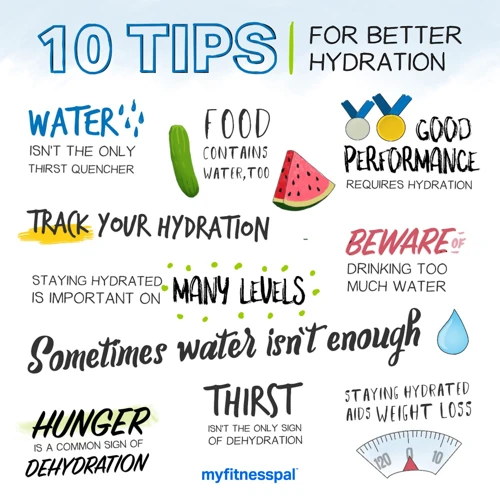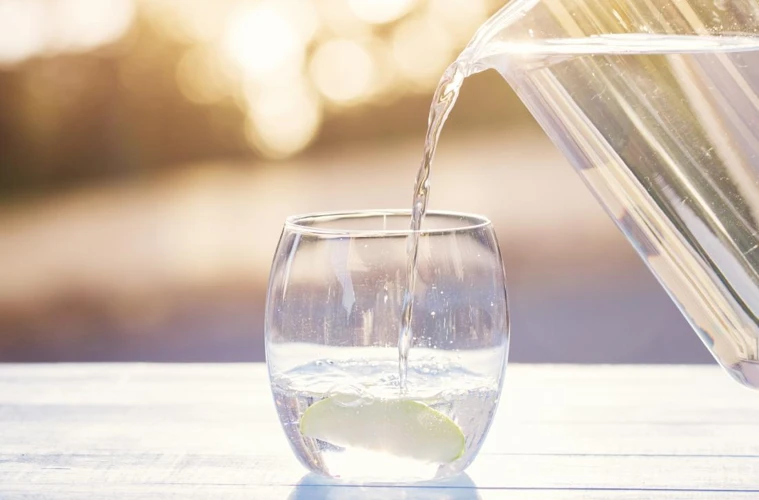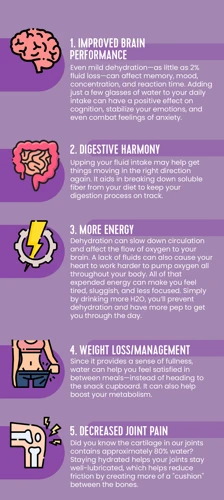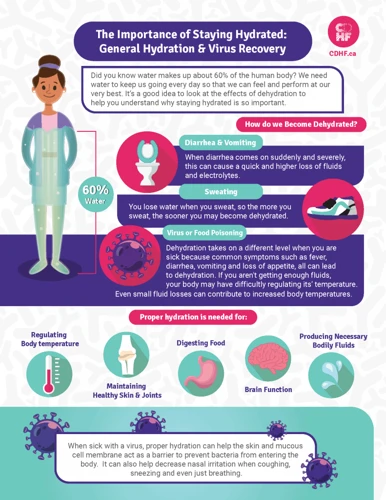Introduction

Many people struggle with hunger and snacking while trying to lose weight. It may seem counterintuitive, but one solution to this problem is to focus on hydration. Staying hydrated throughout the day can help curb cravings and reduce the urge to snack on unhealthy foods. In this article, we’ll discuss why hydration is important for weight loss, how it curbs hunger and reduces snacking, and practical tips for staying hydrated. Plus, we’ll explore some additional benefits of hydration for weight loss that you might not have considered. So grab a glass of water and let’s dive in!
Why hydration is important for weight loss
Proper hydration is vital for weight loss. When trying to lose weight, it is important to pay attention to not just what you eat, but also what you drink. Hydration plays a critical role in weight loss because it helps to regulate appetite, reduces snacking, and optimizes metabolism. In fact, studies have shown that drinking water can increase metabolism by up to 30% for as long as 1.5 hours after consumption.
Moreover, drinking water can also help you burn more calories during exercise and increase the amount of fat your body burns for energy. This means that staying hydrated by drinking plenty of water can lead to more efficient weight loss.
On the other hand, dehydration can negatively impact your weight loss progress by slowing down your metabolism, increasing feelings of hunger and leading to overeating. When you are dehydrated, your body can mistake thirst for hunger, which can cause you to consume extra calories through snacking.
Staying hydrated is an essential part of a healthy weight loss plan. By paying attention to your water intake, you can increase your chances of success and reach your weight loss goals in a healthy and sustainable manner.
How hydration curbs hunger

As you embark on your weight loss journey, you may find yourself battling with constant hunger pangs that tempt you to snack on unhealthy treats. However, before you reach for that bag of chips or chocolate bar, consider if you’ve been drinking enough water. Hydration plays a crucial role in curbing hunger, as it not only helps to fill your stomach but also regulates your body’s natural hunger signals. In this section of the article, we’ll explore how adequate hydration can help you control your appetite and ultimately support your weight loss efforts.
Water as an appetite suppressant
When it comes to weight loss, appetite control is crucial. One simple and effective way to achieve this is by staying hydrated with water. Not only does water have numerous health benefits, it can also act as an appetite suppressant. Here’s how:
| Benefit | Explanation |
|---|---|
| Filling up the stomach | Drinking water before meals can help fill up the stomach, making you feel fuller and reducing the amount of food you consume. |
| Delayed hunger signals | Drinking water can cause a delay in the hunger signals sent from the stomach to the brain. This can help reduce the feeling of hunger and keep snacking at bay. |
| Reduced calorie intake | Drinking water instead of high-calorie beverages like soda or juice can significantly reduce overall calorie intake and aid in weight loss. |
It’s important to note that the effectiveness of water as an appetite suppressant may vary from person to person. However, staying hydrated is still an essential part of any weight loss journey. By adding more water to your diet, you can potentially reduce the amount of snacking and overeating that occurs throughout the day.
Effects of dehydration on hunger
Dehydration can have a significant impact on hunger levels, and it’s important to understand the effects it can have on the body when trying to lose weight. Here are some ways in which dehydration can affect our appetite:
- Confusion between hunger and thirst: It’s easy to mistake thirst for hunger, and when we’re dehydrated, our brains can often misinterpret thirst signals as hunger signals. This can lead us to eat when we really just need to drink some water.
- Increased cravings for high-calorie foods: When we don’t drink enough water, our bodies can become deprived of the fluids they need to function properly. This can lead to an increase in cravings for high-calorie and high-sugar foods, as our bodies try to compensate for the lack of energy they’re feeling.
- Slower metabolism: When we’re dehydrated, our bodies try to conserve the fluids they have by slowing down our metabolism. This can make it harder to burn off calories and lose weight.
- Poor digestion: Water helps to keep our digestive system working smoothly, and when we’re dehydrated, we can experience constipation, bloating, and other digestive issues. This can make us feel sluggish and less motivated to exercise or stick to a healthy eating plan.
These effects of dehydration on hunger make it clear that staying hydrated is essential for anyone trying to lose weight. By drinking enough water and keeping our bodies properly hydrated, we can avoid confusing thirst signals with hunger, reduce our cravings for unhealthy foods, boost our metabolism, and keep our digestion working smoothly.
How hydration reduces snacking

When trying to lose weight, one of the biggest challenges is resisting the urge to snack throughout the day. It can be especially difficult when faced with hunger pangs or cravings for high-calorie foods. However, staying hydrated can actually help reduce the urge to snack and make it easier to stick to a healthy eating plan. In this section, we will explore the ways in which hydration can help you reduce snacking and achieve your weight loss goals.
Water as a replacement for high-calorie drinks
When trying to lose weight, many people focus solely on the foods they eat and forget about the calories they consume through drinks. High-calorie drinks such as soda, energy drinks, and sweetened coffee can contribute significantly to weight gain. These beverages are often loaded with sugar and empty calories that offer no nutritional value.
One of the easiest and most effective ways to reduce calorie intake is to replace these sugary drinks with water. Water has zero calories, making it the perfect choice for those looking to lose weight. By drinking more water throughout the day, you can easily cut hundreds of calories from your daily intake without even noticing.
Replacing high-calorie drinks with water can also help control snacking. Oftentimes, we confuse thirst with hunger, leading to unnecessary snacking that can contribute to weight gain. By ensuring you are properly hydrated with water, you can reduce these cravings and prevent overeating.
It’s important to note that not all drinks are created equal. Diet sodas and artificially-sweetened drinks may contain fewer calories, but they are still not as beneficial as water. These drinks can actually contribute to weight gain as they may cause cravings for high-calorie, sugary foods. It’s best to stick to water as your primary source of hydration when trying to lose weight.
By making small changes such as replacing high-calorie drinks with water, you can effectively reduce your calorie intake and achieve your weight loss goals. Plus, drinking water has numerous other benefits for your overall health and well-being. So, make sure to keep a water bottle with you at all times and stay properly hydrated throughout the day.
| High-calorie drinks | Water |
|---|---|
| Soda | Zero calories |
| Energy drinks | Zero calories |
| Sweetened coffee | Zero calories |
Drinking water before meals
If you’re trying to lose weight, drinking water before meals can be a simple yet effective strategy to help you consume fewer calories. Here’s why:
| Benefit | Explanation |
|---|---|
| Reduces calorie intake | Drinking water before a meal can help fill your stomach, reducing the amount of food you consume and ultimately the number of calories you eat. |
| Improves digestion | Drinking water before a meal can also help improve digestion by preparing the stomach for the food that is about to be consumed. |
| Enhances hydration | Drinking water before a meal can contribute to your overall hydration status, which is important for a variety of bodily functions, including weight loss. |
In one study, participants who drank 16 ounces of water 30 minutes before a meal consumed fewer calories during the meal than those who did not drink water beforehand. This small change can add up over time and provide significant benefits for weight loss.
Additionally, it’s important to differentiate between drinking water before a meal versus during a meal. Consuming too much liquid with your food can actually dilute stomach acid and impair digestion. So, it’s best to drink your water separately from your meals.
Drinking water before meals is a simple and effective way to help you eat fewer calories, improve digestion, and enhance hydration during weight loss efforts.
How to stay hydrated

As we’ve established, staying hydrated is vital to achieving and maintaining weight loss. But how do you ensure that you’re getting enough water throughout the day? The answer may seem simple, but it’s not always easy to put into practice. Here are some tips and tricks that can help you stay hydrated and on track with your weight loss goals. From determining how much water you need to drink, to finding ways to make water more appealing, we’ll cover all the essentials to make sure you’re never thirsty or unknowingly dehydrated again.
How much water to drink
Determining the right amount of water to drink can be a bit confusing. There are a lot of factors that can affect how much water an individual needs. However, as a general rule of thumb, experts suggest drinking at least eight 8-ounce glasses of water per day, which equals about 2 liters or half a gallon. This is known as the 8×8 rule.
However, the amount of water a person should drink can vary based on a range of factors such as age, gender, physical activity level, climate, health status, and more.
To get a more personalized estimate, a person can use a hydration calculator, which takes into account some of these factors. Another way to gauge hydration levels is to look at the color of urine. Clear or light-colored urine is a sign of adequate hydration, while dark yellow or amber-colored urine may indicate dehydration.
The following table gives a general idea of how much water a person should strive to drink based on their daily caloric intake:
| Calories per Day | Fluid Intake Recommendation |
|---|---|
| 1,500 | 48-64 ounces or 1.4-1.9 liters |
| 2,000 | 64-80 ounces or 1.9-2.4 liters |
| 2,500 | 80-104 ounces or 2.4-3.1 liters |
| 3,000 | 96-120 ounces or 2.8-3.5 liters |
It’s important to keep in mind that these recommendations are not one-size-fits-all, and a person should always listen to their body and adjust their water intake accordingly. Drinking water when thirsty is a good indicator that the body needs hydration. It’s also important to note that other fluids, such as unsweetened tea or infused water, can contribute to overall hydration levels.
Ways to increase water intake
One way to increase your water intake is to always have a water bottle with you throughout the day. This will serve as a constant reminder to drink more water. Additionally, try infusing your water with fruits like lemon, lime, or strawberries, which can add a refreshing taste to your water and make it more enjoyable to drink.
Another idea is to start your day with a glass of water before you have your morning coffee or breakfast. This can help jumpstart your hydration for the day and help you stay on track.
If you find yourself forgetting to drink water, try using a smartphone app to remind you to drink water at designated intervals throughout the day. Some of these apps even provide personalized hydration goals based on factors like your weight and activity level.
Eating more fruits and vegetables can also help increase your water intake because they have a high water content. Think about adding foods like cucumbers, melons, oranges, and grapes to your daily diet to help with hydration.
Lastly, consider sipping on water throughout the day instead of chugging large amounts at once. This can help your body absorb the water more efficiently and prevent stomach discomfort. By incorporating these simple strategies into your daily routine, you can increase your water intake and reap the benefits of hydration for weight loss.
Other benefits of hydration for weight loss
Staying hydrated is not only essential for weight loss, but it also has other benefits that contribute to a healthy body. Proper hydration can improve physical performance, increase energy levels, and promote healthy digestion.
When your body is dehydrated, your physical abilities may suffer. This means that you may not be able to exercise or work out as effectively, which can slow down weight loss efforts. However, when you are hydrated, you feel more energized, and your muscles are better able to perform. This can help increase your physical activity, improve your endurance, and contribute to weight loss.
In addition to physical activity, proper hydration also supports healthy digestion. Water helps move waste through the digestive system efficiently and prevents constipation. This means that by staying hydrated, you can avoid bloating and other digestive discomforts that may hinder weight loss efforts.
Lastly, drinking enough water can improve overall energy levels. Fatigue is a common side effect of dehydration, and it can leave you feeling tired and sluggish. By drinking enough water, you can improve your energy levels, which can help you stay motivated to maintain a healthy lifestyle.
Proper hydration is an essential component of any weight loss plan. Not only does staying hydrated help curb hunger and reduce snacking, but it also has numerous other benefits that contribute to a healthy body and promote weight loss.
Conclusion
In conclusion, it is evident that hydration plays a crucial role in weight loss. This is because water helps to curb hunger and reduce snacking, which are two of the main culprits of weight gain. By acting as an appetite suppressant, water can help you feel fuller for longer, making it easier to resist the urge to indulge in unhealthy snacks. Insufficient hydration, on the other hand, can lead to increased hunger and cravings.
Furthermore, drinking water as a replacement for high-calorie drinks can significantly lower your calorie intake, resulting in weight loss. By drinking water before meals, you also reduce your appetite, leading to fewer calorie consumptions overall. It is, therefore, essential to stay hydrated and incorporate water into your daily routine.
To ensure proper hydration, you should aim to drink at least eight glasses of water per day. Foods like fruits and vegetables that have high water content can also help you stay hydrated. Additionally, carrying water with you throughout the day can also serve as a reminder to drink more water.
In addition to aiding in weight loss, hydration has several other benefits. For instance, drinking water flushes toxins out of the body, improves skin complexion, and boosts energy levels. These benefits make staying hydrated an overall healthy lifestyle practice.
In conclusion, drinking water is a simple yet effective way of promoting weight loss and maintaining overall health. By curbing hunger and reducing snacking, water is a valuable tool to assist in weight loss. It is, therefore, essential to incorporate hydration as part of your weight loss journey.
Frequently Asked Questions
How does drinking water help with weight loss?
Drinking water before meals can help you eat less by making you feel fuller, and staying hydrated helps your body metabolize fat more efficiently.
Should I drink water even if I don’t feel thirsty?
Yes, by the time you feel thirsty, you are already slightly dehydrated. It’s best to drink water regularly throughout the day.
Can drinking other fluids like tea or juice have the same effect as drinking water?
No, other fluids may contain sugars and calories that can contribute to weight gain instead of loss.
What are some signs that I’m not drinking enough water?
Signs of dehydration include dry mouth, dark urine, fatigue, and headaches.
Can I drink too much water?
Yes, excessive water intake can lead to hyponatremia, which is when your body’s sodium levels become dangerously low.
How can I make sure I’m drinking enough water throughout the day?
Carry a water bottle with you, set reminders to drink water, and substitute high-calorie drinks with water.
Can hydration affect my metabolism?
Yes, staying hydrated can help boost your metabolism and improve your body’s ability to burn fat for energy.
What are some other health benefits of staying hydrated?
Other benefits of staying hydrated include improved digestion, clearer skin, and better kidney function.
Is it necessary to drink 8 glasses of water a day?
No, the amount of water you need to drink varies based on your body weight, activity level, and other factors. It’s best to drink water when you feel thirsty and throughout the day.
Can I drink water during meals?
Yes, drinking water during meals can help you feel fuller and prevent overeating. However, it’s best to avoid drinking too much water during meals, as this can dilute stomach acid and hinder digestion.







